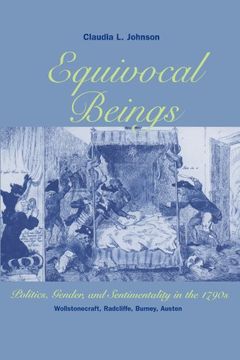Share
Equivocal Beings: Politics, Gender, and Sentimentality in the 1790S--Wollstonecraft, Radcliffe, Burney, Austen
Claudia L. L. Johnson (Author)
·
University Of Chicago Press
· Paperback
Equivocal Beings: Politics, Gender, and Sentimentality in the 1790S--Wollstonecraft, Radcliffe, Burney, Austen - Claudia L. L. Johnson
Choose the list to add your product or create one New List
✓ Product added successfully to the Wishlist.
Go to My Wishlists
Origin: U.S.A.
(Import costs included in the price)
It will be shipped from our warehouse between
Tuesday, June 25 and
Thursday, July 11.
You will receive it anywhere in United Kingdom between 1 and 3 business days after shipment.
Synopsis "Equivocal Beings: Politics, Gender, and Sentimentality in the 1790S--Wollstonecraft, Radcliffe, Burney, Austen"
In the wake of the French Revolution, Edmund Burke argued that civil order depended upon nurturing the sensibility of men—upon the masculine cultivation of traditionally feminine qualities such as sentiment, tenderness, veneration, awe, gratitude, and even prejudice. Writers as diverse as Sterne, Goldsmith, Burke, and Rousseau were politically motivated to represent authority figures as men of feeling, but denied women comparable authority by representing their feelings as inferior, pathological, or criminal. Focusing on Mary Wollstonecraft, Ann Radcliffe, Frances Burney, and Jane Austen, whose popular works culminate and assail this tradition, Claudia L. Johnson examines the legacy male sentimentality left for women of various political persuasions. Demonstrating the interrelationships among politics, gender, and feeling in the fiction of this period, Johnson provides detailed readings of Wollstonecraft, Radcliffe, and Burney, and treats the qualities that were once thought to mar their work—grotesqueness, strain, and excess—as indices of ideological conflict and as strategies of representation during a period of profound political conflict. She maintains that the reactionary reassertion of male sentimentality as a political duty displaced customary gender roles, rendering women, in Wollstonecraft's words, "equivocal beings."

